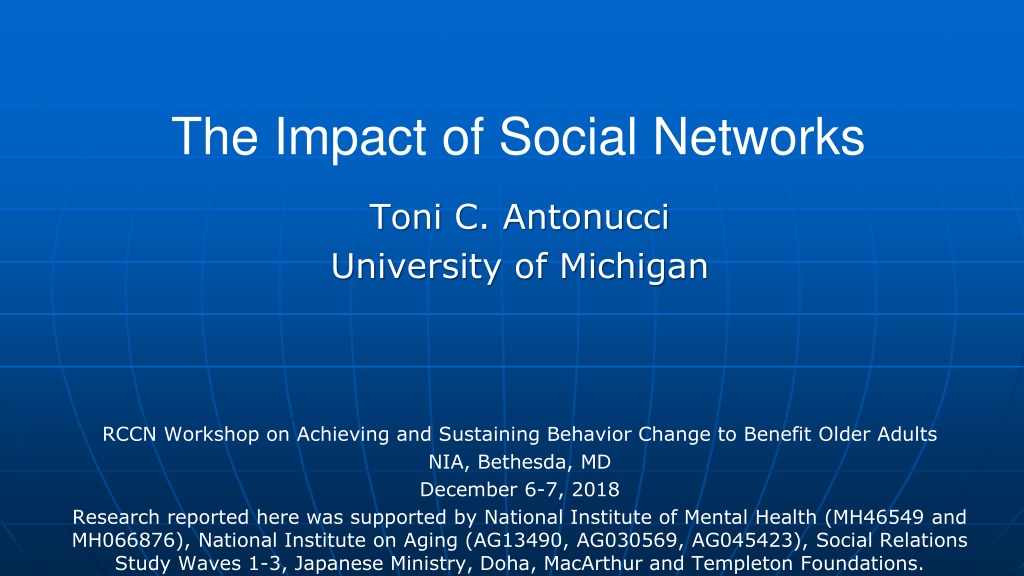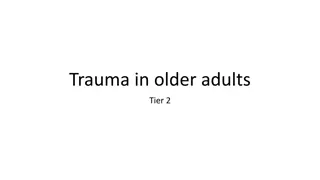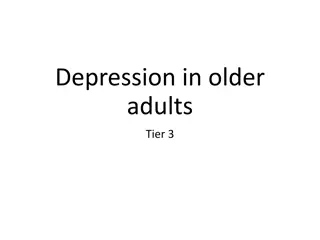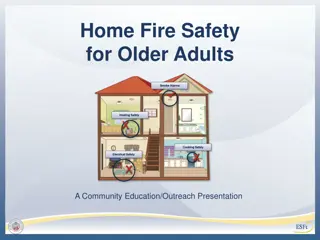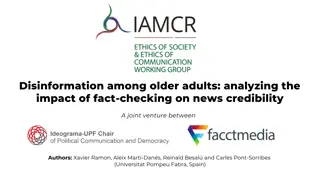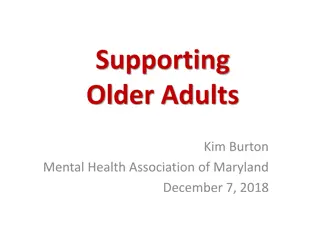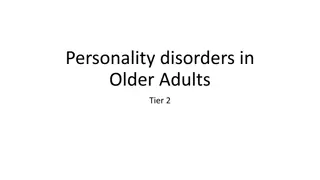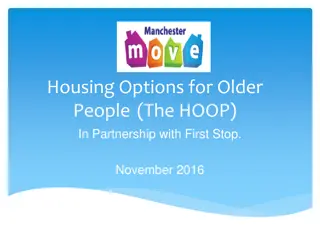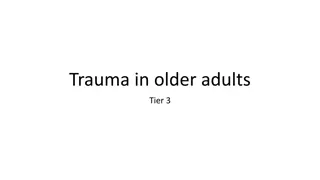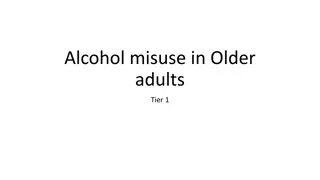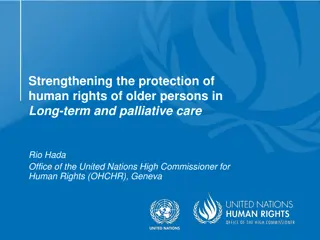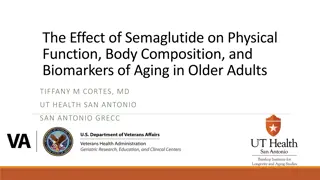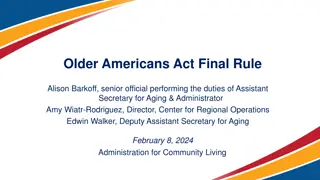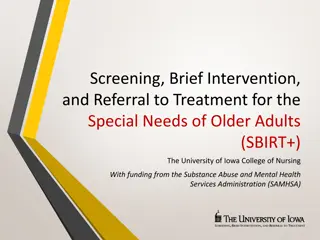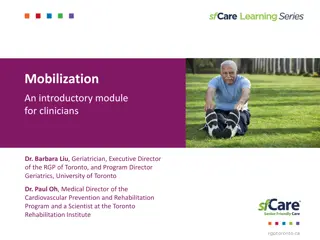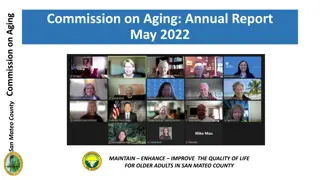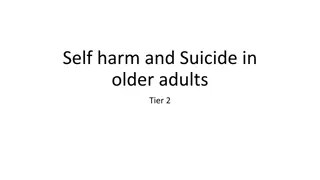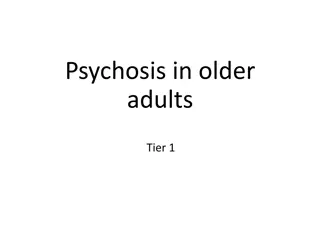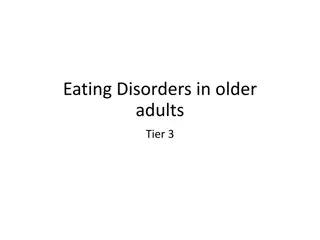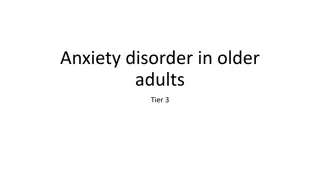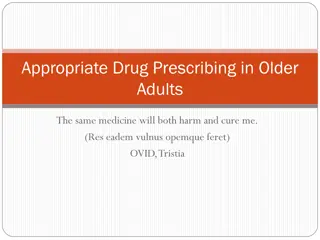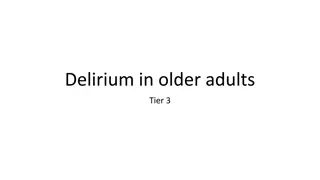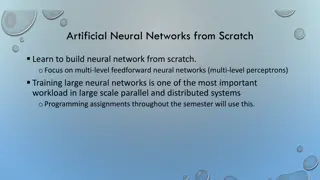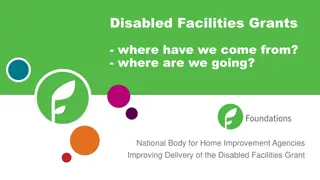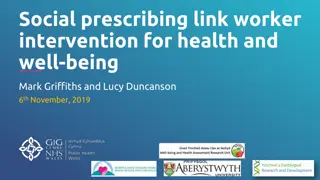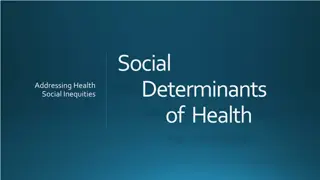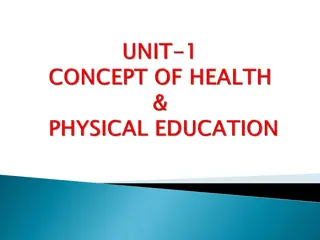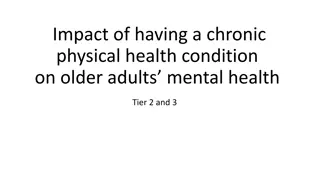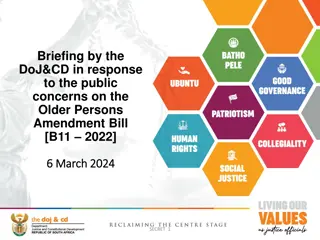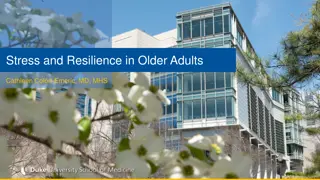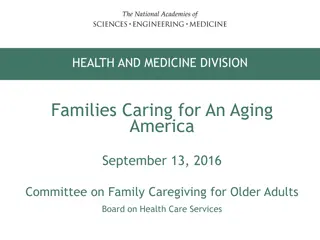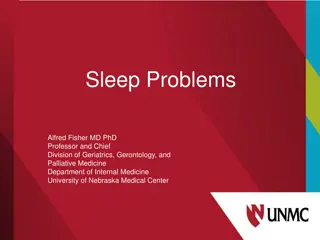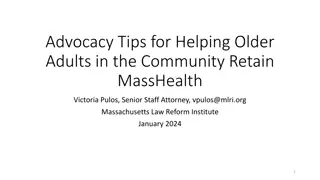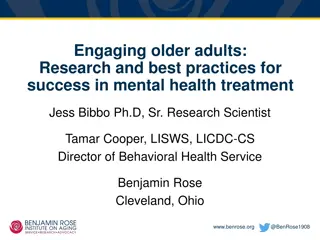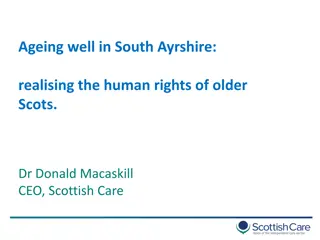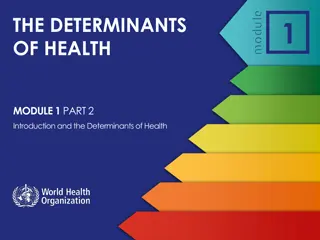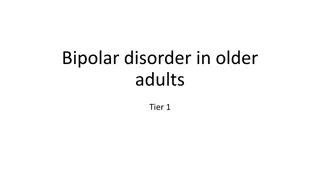Understanding the Impact of Social Networks on Health and Well-being in Older Adults
Explores the significance of social relationships in influencing health behaviors and longevity among older adults. Discusses the multidimensional nature of social networks and the need to incorporate them into interventions for behavior change. Theoretical perspectives like the Convoy Model shed light on how personal and situational characteristics shape social relations. Techniques for measuring social relationships and the importance of both quantity and quality are emphasized.
Download Presentation

Please find below an Image/Link to download the presentation.
The content on the website is provided AS IS for your information and personal use only. It may not be sold, licensed, or shared on other websites without obtaining consent from the author. Download presentation by click this link. If you encounter any issues during the download, it is possible that the publisher has removed the file from their server.
E N D
Presentation Transcript
The Impact of Social Networks Toni C. Antonucci University of Michigan RCCN Workshop on Achieving and Sustaining Behavior Change to Benefit Older Adults NIA, Bethesda, MD December 6-7, 2018 Research reported here was supported by National Institute of Mental Health (MH46549 and MH066876), National Institute on Aging (AG13490, AG030569, AG045423), Social Relations Study Waves 1-3, Japanese Ministry, Doha, MacArthur and Templeton Foundations.
Social Relationships What we know Linked to health and longevity Impact health behaviors Vary across contexts Are multidimensional (structure, composition, quality) What we do not know How links to health shaped by context How to incorporate into interventions Most effective aspects at changing & sustaining health behavior Toni Antonucci, "Achieving and Sustaining Behavior Change to Benefit Older Adults" Dec 6-7, 2018
Theoretical Perspectives Convoy Model of Social Relations Personal Characteristics Convoy Structure Convoy Support Convoy Quality Health & Well-being Situational Characteristics Personal characteristics (i.e., education, age) Situational characteristics (i.e., housing context) Antonucci, T.C., Birditt, K.S., & Ajrouch, K. (2011). Convoys of social relations: Past, present, and future. In K.L. Fingerman, J. Smith, & C. Berg (Eds.), Handbook of life-span development (pp.161-182). New York: Springer Publishing Company. Toni Antonucci, "Achieving and Sustaining Behavior Change to Benefit Older Adults" Dec 6-7, 2018 Kahn, R.L., & Antonucci, T.C. (1980). Convoys over the life course: Attachment, roles, and social support. In P.B. Baltes, & O. Brim (Eds.), Life-span development and behavior(Vol. 3). New York: Academic Press.
Measured Social Relations with Hierarchical Mapping Technique Network Structure Network size: 0-35 Contact frequency Proximity Network Composition % inner circle % family % younger than 25 YOU Toni Antonucci, "Achieving and Sustaining Behavior Change to Benefit Older Adults" Dec 6-7, 2018
State of the Art/Cutting Edge Data Both quantity and quality of relations are important Ambivalence is common may even be useful Multiple sources of support preferable but not possible People are psychological so is a major aspect of the social relations Toni Antonucci, "Achieving and Sustaining Behavior Change to Benefit Older Adults" Dec 6-7, 2018
State of the Art/Cutting Edge Data Mutiple sources of data are useful Positive and Negative Support Networks Biology and neuroscience offering new insights Social relations - both objective and subjective; modifiable Need to know more about how Social relations are dynamic important for intervention work Toni Antonucci, "Achieving and Sustaining Behavior Change to Benefit Older Adults" Dec 6-7, 2018
Some Data: MAC House intervention in HUD Senior housing Areas: physical, intellectual, social, community Exercise group: donated equipment; music; young instructor; visitors; singing; turn taking Stability for 80+ very important Improvement intellectual, community, social, <falls, < ER visits; energy Decline just one, functional health Toni Antonucci, "Achieving and Sustaining Behavior Change to Benefit Older Adults" Dec 6-7, 2018
More Data: HUMILITY: Detroit area; 3 groups Humility: Whites < Blacks < Middle Eastern/North African (MENA) Older people: smaller networks & humble +health No link for older people with larger networks Whites only: more humility better health, < dep Toni Antonucci, "Achieving and Sustaining Behavior Change to Benefit Older Adults" Dec 6-7, 2018
Some Data: FORGIVENESS People with larger networks more Forgiving Whites < Blacks; Whites < MENA More Forgiving <Depressive Symptoms Larger network influences Depressive Symptoms through Forgiveness We Forgive people we feel close to regardless of Race/Ethnicity Toni Antonucci, "Achieving and Sustaining Behavior Change to Benefit Older Adults" Dec 6-7, 2018
FOUR NATIONS US, Japan, Mexico and Lebanon Similarities Differences Associations Toni Antonucci, "Achieving and Sustaining Behavior Change to Benefit Older Adults" Dec 6-7, 2018
Major Gaps in the Field Conceptual: The Good, the Bad, and the Ugly Are conversion experiences possible? Can problematic relationships be managed? Can you 86 close relations? Toni Antonucci, "Achieving and Sustaining Behavior Change to Benefit Older Adults" Dec 6-7, 2018
Major Gaps in the Field Methodological: How to assess what is really needed? What kind of samples are best? Can multiple sources of data collection be used? Toni Antonucci, "Achieving and Sustaining Behavior Change to Benefit Older Adults" Dec 6-7, 2018
Major Gaps in the Field Practical: Can non-experts do it? What is most needed? Does intent count more than anything else? Toni Antonucci, "Achieving and Sustaining Behavior Change to Benefit Older Adults" Dec 6-7, 2018
Social Relations and Interventions: Recommendations Be Planful health maintenance; health behaviors; memory training, living circumstances Be Flexible marathon running, wheelchair exercises; plan different social relations life as a couple, a widow, a friend, an Ann Arbor resident Be Different conventional/new treatment; diets; drugs; life styles, relationships Be revolutionary think outside the box; make sure it works for you Toni Antonucci, "Achieving and Sustaining Behavior Change to Benefit Older Adults" Dec 6-7, 2018
